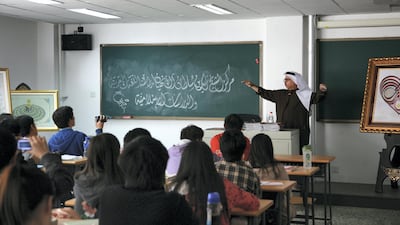In a classroom in Beijing students are learning one of the hardest languages in the world and it’s not Chinese: it’s Arabic.
Almost 1,000 of them have graduated from the Sheikh Zayed Centre for Arabic and Islamic Studies at Beijing Foreign Studies University since it was established in 1994.
That level of exchange is about to be boosted even further when the UAE plays host to Chinese President Xi Jinping this week.
Students at the Beijing institution enrol in the Arabic course for varied reasons, whether it’s a fascination with Arab legends or the search for a good career.
But for many, what began as a quest to learn the language has become a mission to dispel stereotypes of Arabs and Muslims among Chinese people.
“After learning Arabic I began to read some books and I started thinking, ‘What is the cause and reason for the misunderstanding of some Chinese people towards Islamic culture and thought?’” said Li Shijun, 28, a PhD student and Arabic instructor at the university.
“I thought if I learn Arabic then I will do my best to correct the misconceptions, first for my friends around me.
“Then as a teacher and learner and a researcher I can do more to achieve that goal.”
_______________
Read more:
Chinese film superstar Bai Baihe arrives in Abu Dhabi as UAE's cultural exchange begins
UAE to welcome China president Xi Jinping in landmark state visit
Foundations of a great friendship: Sheikh Zayed’s 1990 visit to China
_______________
Mr Li’s interest in Arabic began at a young age.
“The atmosphere in my city when I was growing up was full of harmony between Muslims and non-Muslims,” he said.
“I had many friends who were born Muslims and they spoke a little Arabic. And from that time I was curious about
the language.”
Mr Li was also attracted to learn a language that was commonly believed to be as difficult as Chinese.
“I thought if I can speak Chinese as a mother language and I could speak Arabic and English, that will bring me the best opportunities for my job and career,” he said.
The centre was built with a grant from Founding Father Sheikh Zayed during a visit to the country in 1990.
It became a centre for teaching Arabic, academic research and book translation, from which some of China’s most prominent diplomats and ambassadors graduated.
Books published by its academics are taught in 50 universities across China. Fifteen of the 17 faculty members are Chinese, the other two, Syrian.
Chinese Muslims make up about 21 million of the country’s 1.4 billion population.
“Some students are motivated to study Arabic out of a passion for the Arabic and Islamic culture, especially Muslim students,” said centre director Dr Choy Ching Quwa.
Others were intrigued by One Thousand and One Nights and “wanted to enter that world”.
Many have approached the language in practical terms, focusing on job opportunities.
“So far, 98 per cent of the graduates were able to find jobs related to their Arabic skills,” Dr Choy said. “Many of the graduates became diplomats or landed jobs at the economy, trade and culture ministries, or Arabic-speaking media channels.
“There are also graduates who specialised in academic and research centres.”
Each year, the centre has 50 bachelor’s, 20 master’s and five doctorate students.
Dr Choy said: “I did not choose Arabic, it chose me.”
He said: “When I started university in 1981 we did not have a choice over what to study.
“I was selected as one of the students who would study Arabic. Nonetheless, I never regretted for one day having studied Arabic.
“I can say that after I studied Arabic, my passion for it grows day by day and it is a difficult language but beautiful and deep, and the deeper I dig in it I find more beauty and magic.”
Dr Choy said: “When we say Islam, there is always a misconception within the Chinese people and Chinese Muslims. They think of it as a religion only, or as Sharia.
“Islam is much bigger than that. In addition to the religion aspect, it is a comprehensive civilisation.” Sheikh Mohammed bin Zayed, Crown Prince of Abu Dhabi and Deputy Supreme Commander of the Armed Forces, attended the relaunch of the Sheikh Zayed Centre in 2012.


